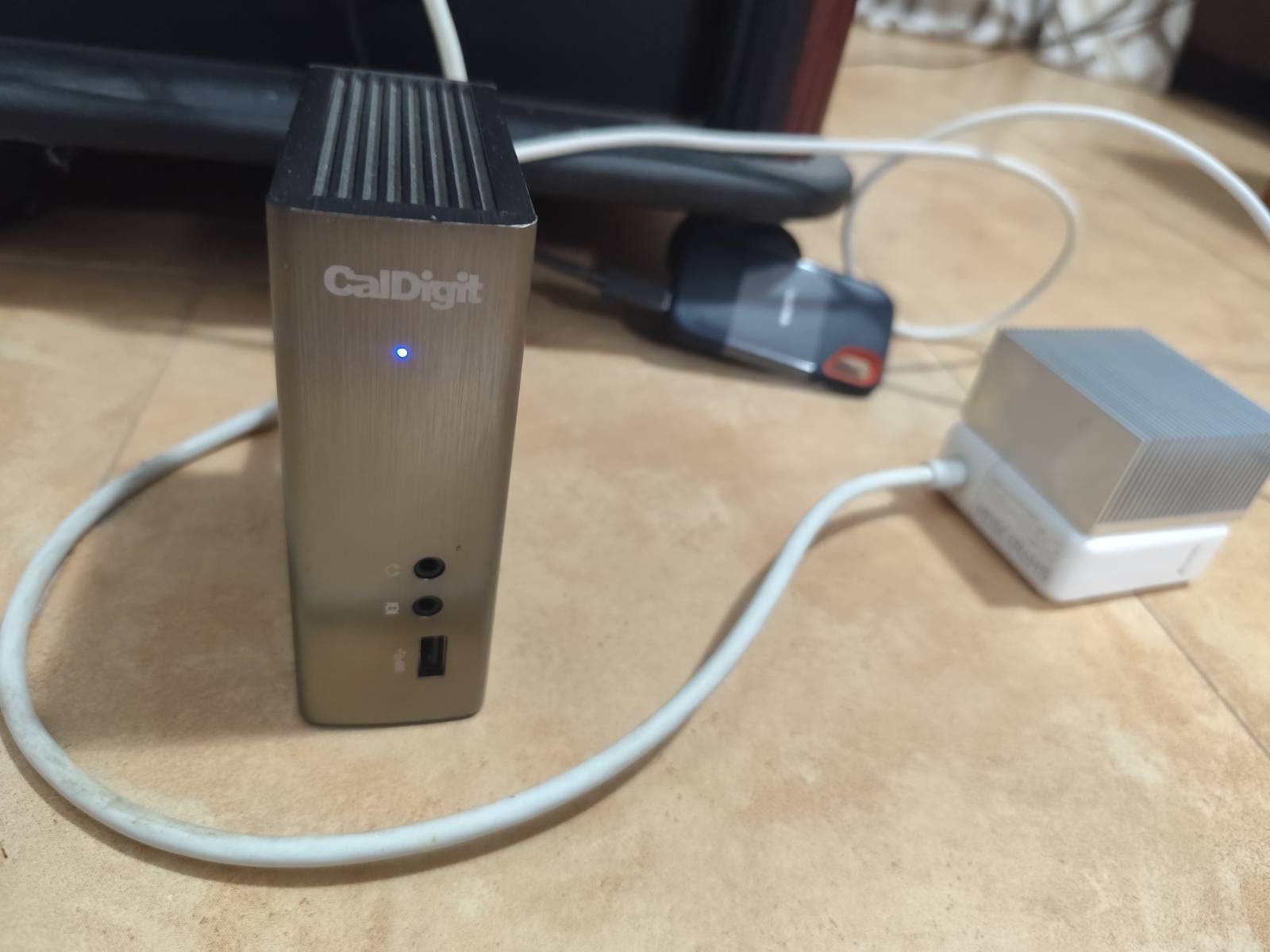System Configuration
- Hardware: Apple MacBook Pro 11,1 (Mid 2013)
- OS: Debian Testing / Kali GNU/Linux Rolling 2025.4
- Kernel: 6.17.8-2-liquorix-amd64
- Device: CalDigit Thunderbolt Station 2 (New device + new Thunderbolt cable)
- Target: Connect USB devices (SanDisk) through Thunderbolt hub
Initial Problem Description
The CalDigit Thunderbolt Station 2 was experiencing connection issues:
- Device would connect and disconnect repeatedly
- Error:
thunderbolt 0000:07:00.0: device link creation from 0000:06:00.0 failed - Error:
0:2: failed to reach state TB_PORT_UP. Ignoring port... - USB devices connected to the CalDigit would not be recognized properly
Root Cause Analysis
The issues were caused by multiple factors:
- Power Management Conflicts: MacBook Pro 11,1 with Liquorix kernel had aggressive power management interfering with Thunderbolt
- PCI Bus Assignment Issues: Insufficient bus numbers allocated for hotplug devices
- Thunderbolt Security: Device authorization problems
- PCIe ASPM: Advanced State Power Management causing communication failures
Complete Solution
Step 1: Kernel Parameter Modification
Edit GRUB configuration to add specific kernel parameters:
sudo joe /etc/default/grub
Modify the GRUB_CMDLINE_LINUX_DEFAULT line to include:
GRUB_CMDLINE_LINUX_DEFAULT="quiet pcie_aspm=off pci=realloc,assign-busses pcie_port_pm=off thunderbolt.start_icm=1"
Parameter Explanation:
pcie_aspm=off: Disables PCIe Advanced State Power Managementpci=realloc,assign-busses: Forces PCI bus reallocation and assignmentpcie_port_pm=off: Disables PCIe port power managementthunderbolt.start_icm=1: Forces Intel Connection Manager startup
Apply changes:
sudo update-grub
sudo reboot
Step 2: Post-Boot Verification
After reboot, verify the CalDigit is detected:
# Check Thunderbolt devices
sudo dmesg | grep -i thunderbolt | head -10
# Should show:
# thunderbolt 0-3: CalDigit, Inc. Thunderbolt Station 2
# No more "device link creation failed" errors
# Verify device listing
ls -la /sys/bus/thunderbolt/devices/
Step 3: Device Authorization with Bolt
Install and configure bolt for Thunderbolt device management:
# Install bolt (if not already installed)
sudo apt update && sudo apt install bolt
# Check device status
sudo boltctl list
# The CalDigit should show as "authorized"
Step 4: Verify USB Functionality
Connect USB devices to the CalDigit and verify recognition:
# Check USB device tree
lsusb -t
# Check connected storage devices
lsblk
# Verify USB devices by-id
ls -la /dev/disk/by-id/ | grep usb
Expected Results
After applying the solution:
- Thunderbolt Detection: CalDigit appears as
thunderbolt 0-3: CalDigit, Inc. Thunderbolt Station 2 - Authorization Status: Device shows as
authorizedin bolt - USB Devices: Connected USB devices appear normally in
lsusbandlsblk - No Error Messages: No more «device link creation failed» or port timeout errors
Troubleshooting Commands
Diagnostic Commands
# View Thunderbolt module parameters
cat /sys/module/thunderbolt/parameters/*
# Check PCI tree for Thunderbolt devices
sudo lspci -tv | grep -A 5 -B 5 Thunderbolt
# Monitor real-time device connections
sudo dmesg -w
# Check device authorization status
cat /sys/bus/thunderbolt/devices/0-3/authorized
# View detailed PCI bridge information
sudo lspci -vvv -s 06:00.0
Reset Commands (if needed)
# Reload Thunderbolt module
sudo modprobe -r thunderbolt
sudo modprobe thunderbolt start_icm=true
# Force PCI rescan
echo 1 | sudo tee /sys/bus/pci/rescan
# Manual device authorization (if bolt fails)
echo 1 | sudo tee /sys/bus/thunderbolt/devices/0-3/authorized
Hardware-Specific Notes
MacBook Pro 11,1 Considerations
- This model uses Intel DSL5520 Thunderbolt 2 Controller (Falcon Ridge 4C 2013)
- Requires specific power management settings due to aggressive power saving in the chipset
- BIOS/EFI settings may need Thunderbolt security set to «No Security» or «User Authorization»
Kernel Compatibility
- Liquorix kernel: More aggressive optimizations can interfere with Thunderbolt
- Standard Debian kernel: Generally more compatible with Apple hardware
- The solution works with Liquorix but may require additional parameters
CalDigit Thunderbolt Station 2 Specifics
- Supports Thunderbolt 2 (20 Gbps)
- Provides 3x USB 3.0 ports, Ethernet, audio, and additional Thunderbolt passthrough
- Requires external power adapter for full functionality
- Some USB devices may require specific ports for optimal performance
Alternative Solutions (if main solution fails)
Option 1: Switch to Standard Kernel
# Install standard Debian kernel
sudo apt install linux-image-amd64
# Select standard kernel at next boot
Option 2: Additional GRUB Parameters
If the main solution partially works but has issues, try adding:
pci=hpbussize=32 acpi=force intel_iommu=off
Option 3: Firmware Updates
# Check for firmware updates
sudo fwupdmgr get-devices
sudo fwupdmgr refresh
sudo fwupdmgr get-updates
Final Notes
- The solution addresses the core compatibility issues between MacBook Pro 11,1, Liquorix kernel, and CalDigit Thunderbolt Station 2
- All kernel parameters are essential for proper operation
- USB devices connected to the CalDigit should work normally after applying the solution
- The fix is persistent across reboots once GRUB is updated
- Monitor dmesg logs if any issues arise with new USB devices
Success Indicators
CalDigit Detection: Device appears in bolt list as authorized
No Error Messages: Clean dmesg output for Thunderbolt events
USB Functionality: Connected devices appear in lsusb and lsblk
Stable Operation: No disconnect/reconnect cycles
Storage Access: USB storage devices mount and operate normally
Hardware: MacBook Pro 11,1 (Mid 2013)
Software: Kali Linux Rolling 2025.4 + Liquorix kernel 6.17.8
Device: CalDigit Thunderbolt Station 2 + Various USB devices

